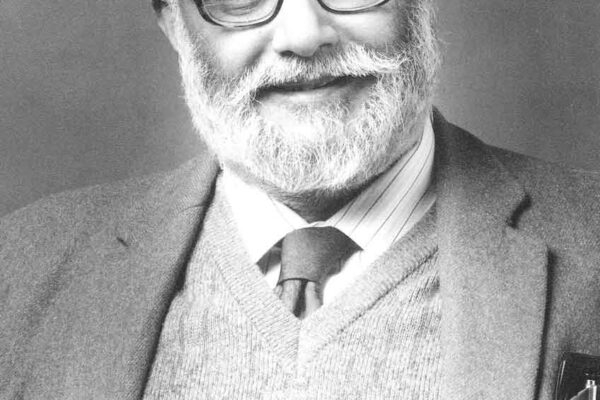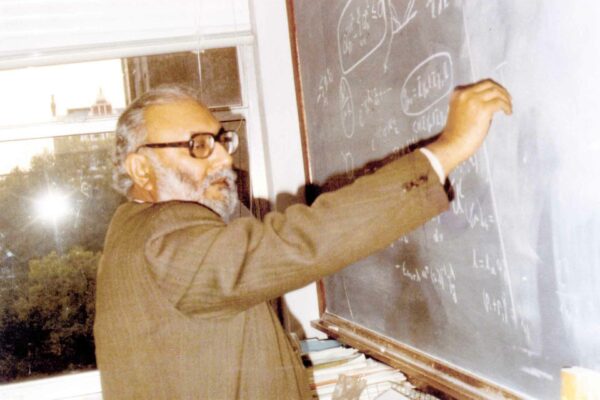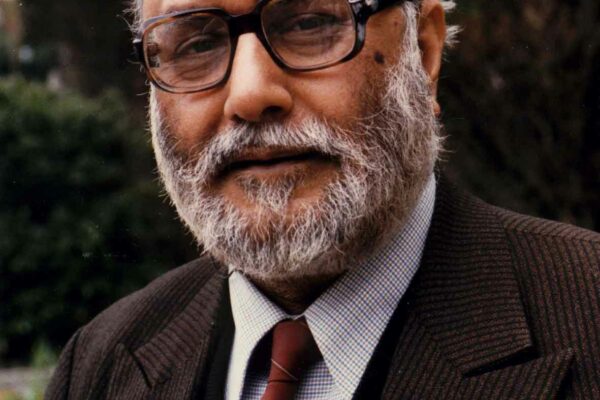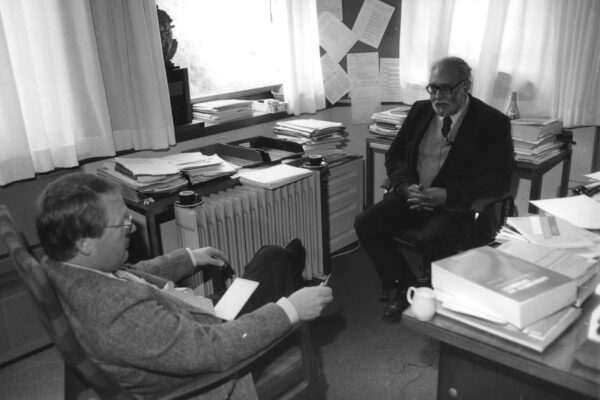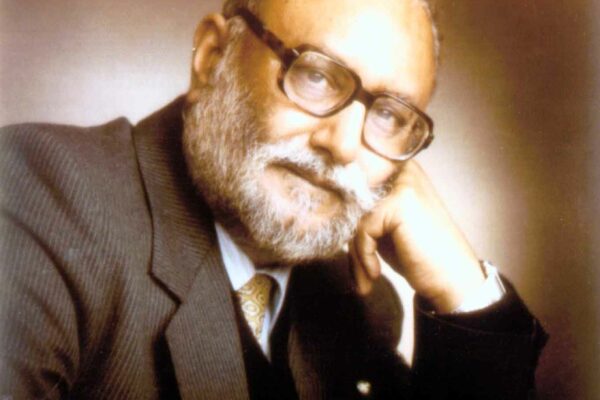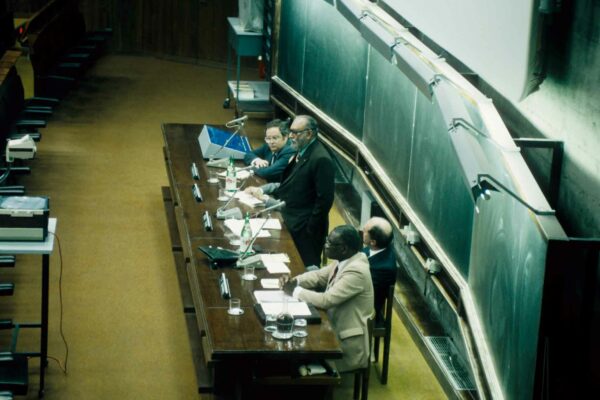”Let us strive to provide equal opportunities to all so that they can engage in the creation of Physics and science for the benefit of all mankind.
Abdus SalamAbdus Salam’s speech at the 1979 Nobel Banquet
Honouring the memory of physicist Abdus Salam
Abdus Salam joined Imperial in 1957, where he remained a professor until his death in 1996. During his time at Imperial, he founded the Theoretical Physics Group with Professor Paul Matthews.
His contributions to science were immense and his work on electroweak unification forms the basis of the Standard Model of particle physics. He further pioneered the effort to capture all fundamental forces in the Universe in a single Grand Unified model that explains their origins and unity at high energies.
Salam was also a passionate, tireless advocate for promoting science in the Global South, founding the International Centre for Theoretical Physics in 1964, which committed to having half of its visiting academics be from developing countries.



Imperial renames library after Salam
In the summer of 2023, Imperial renamed its Central Library to the Abdus Salam Library to honour one of its greatest academics. The official plaque unveiling took place on 29 January 2024.
“Throughout his career, the Nobel Prize winning Professor of Theoretical Physics Abdus Salam made a tremendous contribution to Imperial, as well as to the world of physics and science more generally. It is right that we do more to celebrate this legacy. I hope the new Abdus Salam Library inspires many more people in the years to come.”
– President Hugh Brady
Letter from HRH Prince El Hassan bin Talal
This letter was presented to Ahmad Salam – one of Abdus Salam’s sons – on 29 January 2024, the day that Imperial College London unveiled its new plaque, renaming the Central Library to the Abdus Salam Library.
The letter is addressed from His Royal Highness Prince El Hassan bin Talal, a member of the Jordanian royal family.
It was presented by His Excellency Professor Adnan Badran (Vice President of the Higher Council for Science and Technology) and Professor Humam Ghassib (Professor Emeritus of Theoretical Physics, the University of Jordan), both of whom had personal ties with the late Abdus Salam.
The letter reads as follows: Dear Ahmad, Thank you for giving me this opportunity to pay homage to your esteemed father who was for me a kindred spirit. Professor Abdus Salam was truly a great human being, a giant of a theoretical physicist, and a noble spirit. I would have liked to be present in person on this special day, Abdus Salam Celebration Day at Imperial College; but, unfortunately, some urgent matters have cropped up. Yet I hope I will still be present, in a manner of speaking, through my two representatives. Please allow me on this auspicious occasion to share my thoughts and fond memories with you. Professor Salam was the revered and inspiring mentor of some of our foremost scientists. His legacy is still very much alive in their minds and hearts. However, we in Jordan remember him with special affection and pride for his memorable role in establishing two sturdy institutions of science and technology in our country: the international Petra School of Physics (PSP) and the Higher Council for Science and Technology (HCST). PSP is a school for disseminating advanced physics at an international level, which is sponsored by our two oldest universities, The University of Jordan (Amman) and Yarmouk University (Irbid), and co-sponsored by the Abdus Salam ICTP (Trieste) and myself. Seven PSPs were held during the interval 1982- 2000. Thereafter, the School lay fallow for a variety of reasons, but was revived in 2016. PSP9 (on nanoscience and technology) followed in 2018, and PSP10 (on quantum computing) during the second week of last October. Perhaps the time is ripe now to institutionalise it so as to become a pillar of our scientific landscape. The idea of PSP was first suggested by Professor Salam and myself during two fleeting visits he made to Jordan in 1980 and 1981. It was soon taken to heart by a handful of dedicated Jordanian physicists, who had long been inspired by his vision and ideals and by the outstanding example of ICTP itself. The School was named after Petra, that miracle of a city in the south of Jordan, which the industrious Nabateans carved in the rosy rocks of the mountains more than two millennia ago. In a brief message sent by Salam to PSP held during the last week of October 1982, he wrote: "To those who attend the School from the local universities, may I remind them that Arabic was the language of Science from the 8th to the 13th century; that Baghdad, Damascus, Jerusalem and Cairo were the great centres of Arabic learning. May I remind them that physics is a hard subject which needs the fullest dedication, and that such dedication (even in adverse circumstances) was always the norm for scholars and scientists from this intellectually fertile area" [end of quote]. That refreshing pride in our Arab-Islamic scientific heritage remained a passion of his throughout his career; he emphasised this theme from a different angle in his outstanding Nobel lecture on the 10th of December 1979. All ten PSPs were memorable. There were lucid presentations on solid state physics, magnetism and magnetic materials, superfluidity and superconductivity, physics in low dimensions, in addition to nanoscience and quantum computing. But the remarkable highlight came in PSP3 which was held in early Autumn1985 on lasers and their applications in science and technology, including - of course - medicine and telecommunications. In particular, accompanied by the Jordanian Secretary of Energy and Mineral Resources and his Under-Secretary, I attended the closing session, where a beautiful lecture was given on lasers in fiber optics. As a result, we made the pivotal decision to switch on from coaxial cables to optical fibers, thereby saving more than 60 million US dollars in our national budget. Just imagine! What a magnificent link between physics and development! Following this unforgettable PSP, I convened a meeting at our Royal Scientific Society in Amman, which was co-chaired by Professor Salam and attended by some leading Jordanian scientists and science administrators. The main outcome of this meeting was the launch of our National Committee of Science and Technology which laid the ground over the next two years for our Higher Council for Science and Technology. Since then, HCST has been working out elaborate strategies for a solid base of S & T in the country, with special emphasis on their impact on development - one of the themes closest to Professor Salam's heart. So, you see, Salam's legacy is alive and well amongst us in Jordan. I myself will always treasure the memories of our numerous encounters in Jordan and abroad. I take pride in the feature we prepared about him and his ideas and ideals in a special issue of a leading cultural magazine published by The University of Jordan. In particula4 may I refer here to my article in this feature on Salam's fascination in the concept of unification - not only in nature, but also in faith, and in the whole of human knowledge. This issue is still kept with respect and affection in the ICTP library, together with other memorabilia. I pause here to celebrate with you and the whole family of Imperial College the wise decision to rename the College Library after Professor Salam. what a graceful and timely tribute! No wonder, then, that Salam was deeply concerned with the question of the concordance or conflict between Islam and science. In a speech delivered in Paris at the UNESCO House on 27th of April 1984 at the invitation of the Organization "Islam and the West", he discussed the following topics: The Holy Quran and Science; Early Islam and Science; The Decline of Science in Islam; The Limitations of Science; Faith and Science. In conclusion, he states that “to know the limitations of science, one must be part of living science; otherwise one will continue fighting yesterday's philosophical battles today. There truly is no disconsonance between Islam and modern science". Throughout his illustrious career, Professor Salam sought profound meaning beyond the mundane. His work reminds me of these remarkable words from the well-known book Art of Islam: Language and Meaning (p. 76) by the renowned Swiss academic Titus Burckhardt (1908-1934). Referring to the "artist who wishes to express the 'unity of existence' ([in Arabic,] wahdat al-wujud)", Burckhardt argues that such an artist "has three means at his disposal: geometry, which translates unity into the spatial order; rhythm, which reveals it in the temporal order and indirectly in space; and light, which is to visible forms what Being is to limited existence". wasn't he, unwittingly to be sure, describing Salam's lifework?! At this point, I wish to go further, much further, to some aspects of a philosophy that is close to my heart and mind: the philosophy of Ishraq. This is a magical Arabic word. It is derived from Sharq, meaning the East or the Orient. Ishraq means illumination: Literally, it describes the first light of dawn arising from the East; but, idiomatically, it refers to the enlightenment of Eastern, or Oriental, thought. As emphasised by many thinkers, however, the Orient here is not a geographical term; rather, it signifies a philosophical pool from which light and energy emanate. Don't you think that Professor Salam was one of the great minds that epitomised Ishraq and Sharq? I mourn deeply Professor Salam, hand-in-hand with you and his many students and colleagues; we all miss him, particularly in these turbulent times. But, at the same time, I rejoice in his noble, evergreen legacy. May God the Almighty rest his soul in peace. El Hassan bin Talal

View our Exhibition Collection
Explore archival documents and photos, provided by the International Centre for Theoretical Physics.
